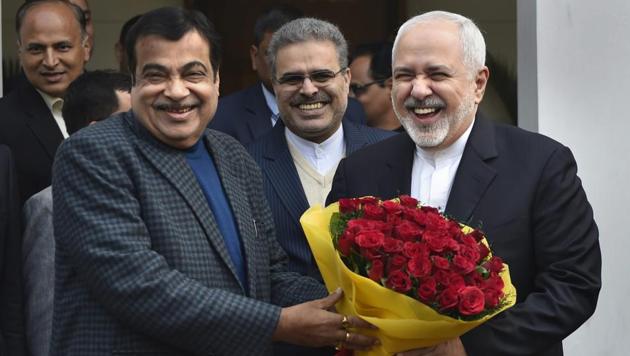Iranian bank to open in Mumbai by March
India has permitted an Iranian private bank to open a branch in Mumbai that is expected to begin operations by March to handle transactions related to New Delhi’s oil purchases in view of American sanctions on Tehran.
India has permitted an Iranian private bank to open a branch in Mumbai that is expected to begin operations by March to handle transactions related to New Delhi’s oil purchases in view of American sanctions on Tehran.

Road transport and shipping minister Nitin Gadkari on Tuesday gave details about the branch of Bank Pasargad after talks with Iran’s foreign minister Javad Zarif, who discussed the possibility of buying rail steel and around 300 railway locomotive engines from India.
The complete operationalisation of Shahid Beheshti terminal of the strategic Chabahar port, taken over by India Ports Global Limited in December, also figured in talks between Gadkari and Zarif. The Iranian side raised the issue of certain equipment that India is committed to procure for this process, people familiar with developments said.
Gadkari told reporters that the two sides were close to resolving several issues, including banking payment mechanisms. “The government has already given an Iranian bank the permission to open its branch in India and they are going to open it in Mumbai in three months. It will be more easy for transactions,” he said.
Also read | ‘India hopes to start full operations soon at Iran’s Chabahar port,’ says Nitin Gadkari
Zarif said, “We are very happy that UCO Bank from India and Bank Pasargad from Iran are getting started with the business. We hope that despite illegal US sanctions, Iran and India can cooperate further.”
India, Iran’s top oil buyer after China, will pay for crude imports in rupees to UCO Bank. Iran will use the funds for importing Indian goods. India got a six month waiver last November to buy crude oil from Iran after it cut imports, and it also got a waiver for developing Chabahar port.
The two sides had a “good discussion” on Chabahar port, including the machinery and equipment needed to fully operationalise the terminal taken over by India. “The financial arrangement is ready, and there were some problems but we have resolved the issues,” he said, adding India has placed orders for machinery worth $85 million and is confident full operations at the terminal will begin “as early as possible”.
Gadkari said Zarif gave him several proposals, including procuring rail steel and around 250 to 300 railway locomotive engines from India. “They are also ready to provide urea at a low cost,” Gadkari added.
Addressing the India-Iran Business Forum, Zarif criticised the US sanctions and said the “political will of the two governments and the strong economic interests of the two business communities would certainly overcome the challenges that exist”. Without naming the US or President Donald Trump, he said “a single country and a single individual” were preventing the normalisation of Iran’s economic relations.
“We provide…almost a third of the required urea fertilisers to India, which your farmers need. Today they are paying 38% more because of these US sanctions that prevent Iran from selling them to you directly,” he said.
Zarif added, “Iran, I can assure you, is the most reliable energy provider for India. We have never allowed any consideration to impede our economic relations with our partners.”
Chabahar port, on Iran’s southern coast along the Gulf of Oman, is being developed as a transportation corridor for landlocked Afghanistan that bypasses Pakistan.
Ircon and Construction, Development of Transport and Infrastructure Company (CDTIC) of Iran are now building the Chabahar-Zahedan railway line.
Vishwas Udgirkar, a partner at Deloitte India, said: “India has been trying to make the port operational since more than a decade. There were various external, internal and political issues. Therefore, it is a good positive development that India has finally taken over operations. Particularly, if we look at Iran for availability of gas, it is a very critical development.”
Also read | Why Chabahar port is a win-win for India






